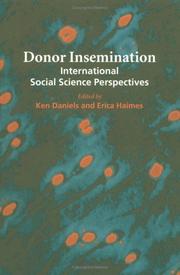| Listing 1 - 3 of 3 |
Sort by
|
Book
Abstract | Keywords | Export | Availability | Bookmark
 Loading...
Loading...Choose an application
- Reference Manager
- EndNote
- RefWorks (Direct export to RefWorks)
Book
ISBN: 9781845451127 9781845451134 1845451120 1845451139 9786612627347 1845458672 1282627341 Year: 2009 Publisher: New York, N.Y. Berghahn
Abstract | Keywords | Export | Availability | Bookmark
 Loading...
Loading...Choose an application
- Reference Manager
- EndNote
- RefWorks (Direct export to RefWorks)
Conceiving Kinship is an in-depth journey, the first of its kind, into how heterosexual, lesbian and gay couples using programmes of gamete donation conceptualize and make Italian kinship. It explores the provision of treatment in clinical and non-clinical settings at a time when Italy was considered the 'Wild-West' of assisted conception. This compelling study provides a new perspective on hotly debated issues in kinship studies and the modern medical technologies; it offers fresh insights into longstanding questions of cultural continuities and discontinuities in European kinship.<
Sociology of the family. Sociology of sexuality --- Italy --- Reproductive technology --- -Medical anthropology. --- Insemination, Artificial, Heterologous --- -Oocyte Donation --- -392.3 <45> --- Medical care --- Medicine --- Anthropology --- Assisted reproduction --- Reproduction --- Biotechnology --- psychology --- -psychology --- -Familieleven. Familiesystemen. Gezinsleven. Matriarchaat. Patriarchaat. Kinship--Italië --- Anthropological aspects --- Technological innovations --- Medical anthropology. --- Oocyte Donation --- Family Relations --- Heterosexuality --- Homosexuality --- Social Identification --- 392.3 <45> Familieleven. Familiesystemen. Gezinsleven. Matriarchaat. Patriarchaat. Kinship--Italië --- Familieleven. Familiesystemen. Gezinsleven. Matriarchaat. Patriarchaat. Kinship--Italië --- Medical anthropology --- 392.3 <45> --- Sociologie van het gezin. Sociologie van de seksualiteit --- Italië --- ART (Assisted reproductive technology) --- Assisted reproductive technology --- Reproductive techniques --- Family relations -- Italy. --- Reproductive technology -- Italy. --- Artificial insemination --- Relationship doctor and patient --- Sperm donors --- Book --- Egg cell donor --- Lineage

ISBN: 0521497833 0521497094 9780521497091 9780521497831 9780511557804 0511557809 Year: 1998 Publisher: New York Cambridge University Press
Abstract | Keywords | Export | Availability | Bookmark
 Loading...
Loading...Choose an application
- Reference Manager
- EndNote
- RefWorks (Direct export to RefWorks)
Donor insemination or DI is the oldest and most widely practised form of assisted conception but, until relatively recently, it had been assessed largely from a medical perspective. This 1998 book brings together an international group of social scientists to discuss the social, cultural, political and practical dimensions to DI, relating it to the wider debates about fertility treatment and the place of assisted conception in contemporary society. The contributors consider the experience of DI from the viewpoint of all the various parties involved, including the recipients of the treatment, the sperm providers, the clinicians, the people conceived and policy-makers working in the area. The assumptions informing the practices around DI and the reactions to it are critically examined, with reference to developments worldwide, cross-national issues, the language of DI, gender, sexuality, ethnicity and identity.
Insemination, Artificial, Heterologous --- Artificial insemination, Human --- Kunstmatige inseminatie. --- Donors. --- Insémination artificielle humaine --- sociology. --- Moral and ethical aspects. --- Social aspects. --- Aspect social --- kunstmatige inseminatie (kunstmatige inseminatie met donor, KID) --- sociologie (sociologische aspecten) --- insémination artificielle (insémination artificielle avec doneur, IAD, insémination artificielle intra-conjugale, insémination artificielle avec conjoint, IAC) --- sociologie (aspects sociologiques) --- Insémination artificielle humaine --- Gynaecology. Obstetrics --- Sociology --- Artificial insemination [Human ] --- Social aspects --- Artificial insemination, Human - Social aspects. --- Donor insemination, Human --- Human artificial insemination --- Human donor insemination --- Human reproductive technology --- Social Sciences --- Artificial insemination --- Attitudes --- Sperm donors --- Book
| Listing 1 - 3 of 3 |
Sort by
|

 Search
Search Feedback
Feedback About UniCat
About UniCat  Help
Help News
News